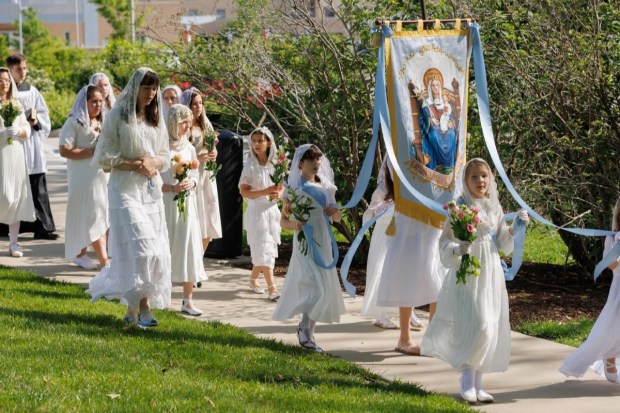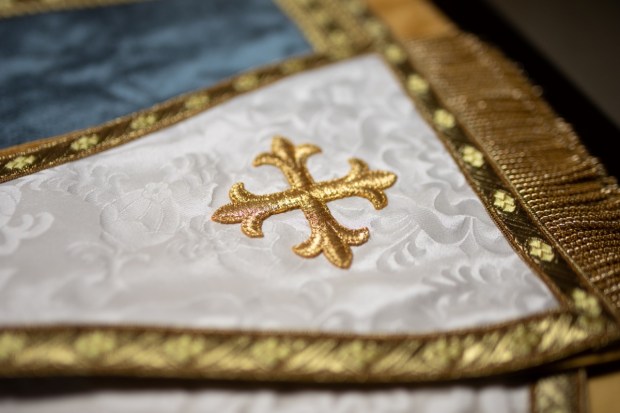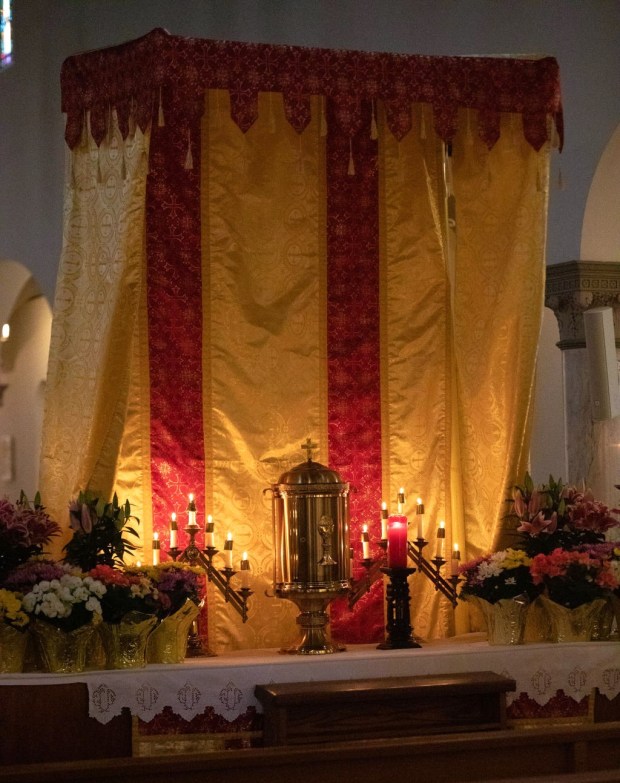Recently, my daughter painted an image of Our Lady of Walsingham onto a piece of silk. A woman from our parish took the image and sewed it onto a decorated banner so our parish girls could carry it during a May Crowning procession. On the day of the Crowning, the girls all arrived dressed in their fanciest white dresses, hands full of fresh flowers, and proudly took their place in the procession with their new banner. They’d had spent months memorizing and learning to sing Marian hymns such as the Salve Regina, and as we marched, they joined in the singing with enthusiasm. (You can view a PHOTO GALLERY of the May Crowning at the end of this article.)

From the look on their faces, I could tell that they were genuinely pleased to be able to participate in something so beautiful and to have been given such an important role in a parish devotion. The girls who participated are all school age, but their work and the liturgy to which they added so much were not childish or low-quality. Their efforts weren’t the sort of thing happy parents gush over while everyone else simply endures until it’s over. What they accomplished was really quite amazing.
Over the past year, the girls have been meeting a few times per month to learn what we might refer to as the Decorative Arts. They’ve sewed vestments for priests, made linens for the altar, worked on flower arrangements for the altar, made banners, practiced singing, and crafted all sorts of beautiful devotional items for their homes. They’re amateurs in their chosen arts, yes, but they’re learning quickly. Their contributions to the parish and their homes have already been quite remarkable.
The lost art of decorating
I’m not sure even many adults currently have the skills to accomplish what those girls did. In our modern era of big box stores and mass-produced factory goods, the Decorative Arts have fallen by the wayside. Many of the skills that were once common have become far less so. It used to be that almost everyone had experience in some craft or other – woodworking, painting, masonry, sewing, embroidery, singing, glasswork, metalwork, and so on.
But today, the decoration of local churches is often delegated to large companies who manufacture banners, paintings, rosaries, statues, and all manner of other devotional items. What I notice about these mass-produced items for use in churches is that the quality is lower than with handmade items. The designs are also more generic. After all, those companies must make a profit. That means they must be efficient. They have to sell a design to as large an audience as possible, so the designs tend to be lowest-common-denominator stuff. I cannot say how many churches I've been in that display the same bland banners.
The value of local artistry
The best vestments, in my opinion, are always made by a local Catholic who has worked hard to gain the knowledge and skill required. These locals are crafting their contributions out of love. They love God and also love the local parish with all its unique history and customs. All the best rosaries are handmade. Flowers that are handpicked and donated from local gardens make the best decorations for shrines. And the best altar frontals are always sewed by parishioners.

What holds true for the parish also holds true for our homes. My favorite decorations in our home were made by my children, not purchased from a big box store. I love to frame their artwork and I love the flower arrangements they make from plants that they’ve picked in our yard. Our garden is lovely because my wife uses her expanding knowledge of plants to keep it vibrant. In the evenings, I prefer to sit at the piano and make my own music rather than stream a pre-made playlist via the internet.
Are our efforts professional? No, but for us there is no substitute.
Decorative Arts vs. Fine Arts
The reason the Decorative Arts have now been delegated to professionals is because the required skills have languished. Fewer people learn the skills required and it takes great effort to recover them. I wonder if the reason is because we’re intimidated. We are confusing the Decorative Arts with the Fine Arts.
There will always be a need for the Fine Arts, of course -- artistic creations meant for a public space, concert hall, or museum. We need highly trained professional artists to paint the finely wrought images of saints with which we beautify our spaces. Architects are needed to ensure our buildings meets code. Sacred music can't be properly performed without professional organists who thoroughly understand not only their instruments, but the deep tradition of sacred music.
The Fine Arts will always be with us. They require rare talent, along with the training to bring that talent to fruition. Not just anyone can fill these roles. We would end up with bad results were we to delegate the Fine Arts to amateurs.
Anyone can become a decorative artist
But anyone (and I mean absolutely anyone) willing to invest enough patience and effort can acquire mastery in a Decorative Art. We don’t need to be endowed with natural genius and trained in professional art schools in order to make beautiful things. I’ve seen neighborhood yards bursting with flowers, girls who have taught themselves to sew and made amazing dresses for themselves, and amateur singers who have joined the parish choir and improved tremendously. All it takes to recover the Decorative Arts is a willingness to put in the effort.

Look, I don’t want to be the guy who goes on the internet and bemoans the uglification of our culture. All of us already know that our culture has devolved. Personally, I don’t know if Taylor Swift and current teen fashion and Instagram are all that much worse than what I grew up with in the 80s -- but if we compare this era's culture to the Victorian or medieval eras, it seems pretty obvious that art, architecture, churches, and music are all worse.
It’s not because those eras had better artists available than we have today. Rather, it’s because of the value they placed in the Decorative Arts. They viewed those arts as an expression of their love for their local place, their parish and neighborhood.
We make beauty because we are made for beauty
The pursuit of pure efficiency at the cost of neglecting beauty isn’t a path to human thriving. We are made for beauty. It isn’t enough to make an efficient, plain building or item and then slap a few professionally made decorations on the surfaces in order to dress it up. Beauty needs to be the very idea of the thing.
We are crafting beauty into the usefulness of every item in an organic, symbiotic relationship. Human beings delight in beauty, which is an expression of joy and freedom to create alongside God’s creativity. It’s a way of recognizing how good God’s creation really is, while striving to bring to it a little more goodness.
The Decorative Arts are how happy, ordinary people create beautiful things. So let this be an encouragement to you to put in the practice, master a Decorative Art, be creative, and value the gifts each of us has been given.
☩
View the PHOTO GALLERY below to see more of the May Crowning procession mentioned in the article.




